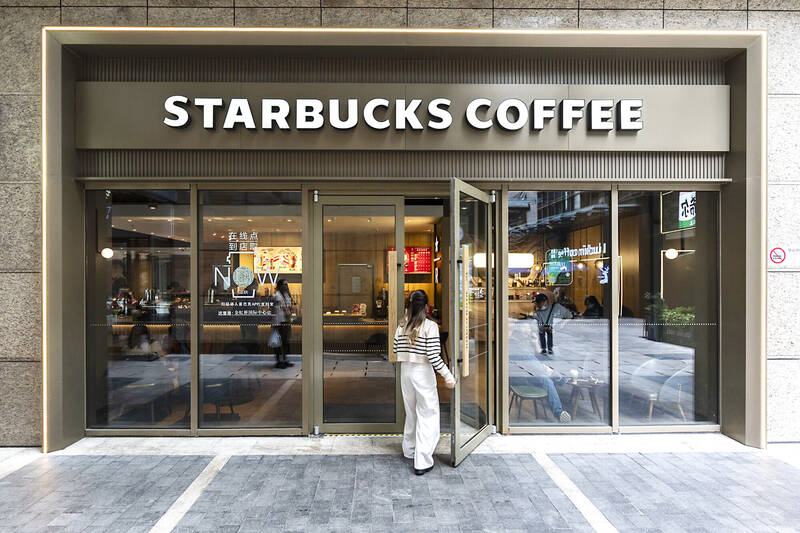Starbucks Corp hired its first chief growth officer in China, tasked with luring back young coffee drinkers as the US chain struggles with cheaper local rivals in its biggest international market.
The executive, Tony Yang (楊振), has been on board since last month and would pursue a strategy of brokering tie-ins with entertainment franchises and pop culture icons to market itself to consumers, Starbucks China said yesterday.
The China product development, research and development, and marketing departments would all report to Yang, a former user development executive at Geely Holding Group Co (吉利控股集團)-backed electric vehicle maker Jiyue Auto (極越). His role would also focus on coffee product innovation and improving customer experience.

Photo: Bloomberg
China is “an important growth engine for the future,” the company said.
Starbucks was once seen as largely infallible in China, where flush consumers flocked to western brands high in prestige. However, it has struggled as the economy slows, with cash-strapped diners pulling back on pricier drinks in favor of cheaper local upstarts whose coffees can cost just one-third of a Starbucks cup.
Key rival Luckin Coffee Inc (瑞幸咖啡) surpassed the Seattle-based company in annual China sales for the first time last year, and Starbucks is exploring options for its mainland operations, including the possibility of selling a stake in the unit, Bloomberg has reported.
Yang’s pledge to collaborate with pop culture franchises shows how the company wants to tap brand power other than its own to salvage Chinese business, with comparable sales down 14 percent in the September quarter.
It also takes a page from the book used by Luckin, which has long made such partnerships a cornerstone of its marketing strategy. Luckin’s recent successes have seen a tie-in with popular video game Black Myth: Wukong (黑神話:悟空), and an alcohol-laced latte made with premium domestic liquor label Kweichow Moutai (貴州茅台) that boosted both sales and online hype.
Starbucks’ new CEO Brian Niccol previously said he would travel this month to China, where the company operates more than 7,600 stores, to better understand the local business and competition.

SEEKING CLARITY: Washington should not adopt measures that create uncertainties for ‘existing semiconductor investments,’ TSMC said referring to its US$165 billion in the US Taiwan Semiconductor Manufacturing Co (TSMC, 台積電) told the US that any future tariffs on Taiwanese semiconductors could reduce demand for chips and derail its pledge to increase its investment in Arizona. “New import restrictions could jeopardize current US leadership in the competitive technology industry and create uncertainties for many committed semiconductor capital projects in the US, including TSMC Arizona’s significant investment plan in Phoenix,” the chipmaker wrote in a letter to the US Department of Commerce. TSMC issued the warning in response to a solicitation for comments by the department on a possible tariff on semiconductor imports by US President Donald Trump’s

The government has launched a three-pronged strategy to attract local and international talent, aiming to position Taiwan as a new global hub following Nvidia Corp’s announcement that it has chosen Taipei as the site of its Taiwan headquarters. Nvidia cofounder and CEO Jensen Huang (黃仁勳) on Monday last week announced during his keynote speech at the Computex trade show in Taipei that the Nvidia Constellation, the company’s planned Taiwan headquarters, would be located in the Beitou-Shilin Technology Park (北投士林科技園區) in Taipei. Huang’s decision to establish a base in Taiwan is “primarily due to Taiwan’s talent pool and its strength in the semiconductor

An earnings report from semiconductor giant and artificial intelligence (AI) bellwether Nvidia Corp takes center stage for Wall Street this week, as stocks hit a speed bump of worries over US federal deficits driving up Treasury yields. US equities pulled back last week after a torrid rally, as investors turned their attention to tax and spending legislation poised to swell the US government’s US$36 trillion in debt. Long-dated US Treasury yields rose amid the fiscal worries, with the 30-year yield topping 5 percent and hitting its highest level since late 2023. Stocks were dealt another blow on Friday when US President Donald

UNCERTAINTY: Investors remain worried that trade negotiations with Washington could go poorly, given Trump’s inconsistency on tariffs in his second term, experts said The consumer confidence index this month fell for a ninth consecutive month to its lowest level in 13 months, as global trade uncertainties and tariff risks cloud Taiwan’s economic outlook, a survey released yesterday by National Central University found. The biggest decline came from the timing for stock investments, which plunged 11.82 points to 26.82, underscoring bleak investor confidence, it said. “Although the TAIEX reclaimed the 21,000-point mark after the US and China agreed to bury the hatchet for 90 days, investors remain worried that the situation would turn sour later,” said Dachrahn Wu (吳大任), director of the university’s Research Center for